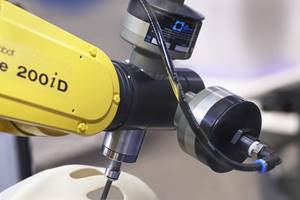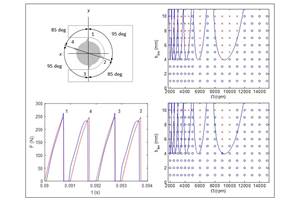New Treatment Extends Tool Life
Heat is the major enemy of the cutting tool. Tool life is a measure of how long an individual edge can effectively hold up to the temperatures and pressures that are generated in the cutting zone.
Share


Hwacheon Machinery America, Inc.
Featured Content
View More

Takumi USA
Featured Content
View More




Heat is the major enemy of the cutting tool. Tool life is a measure of how long an individual edge can effectively hold up to the temperatures and pressures that are generated in the cutting zone.
Most cutting edges are designed to first raise a chip from the workpiece and then, using various shapes built into the face of the cutting edge, curl and break the chip so it evacuates the cutting zone.
As the chip moves first across the cutting edge and over the face of the cutter, friction is created by the rubbing action between the chip and tool. Friction is a source of heat, and to help minimize heat, the cutting tool must be sharp and smooth.
However, if a cutting tool is placed under the microscope, imperfections on what appears to be a sharp, smooth edge are revealed. This is true on both new and reground tools. The severity of imperfections varies among different materials and manufacturing processes, but most cutting tools display microscopic irregularities.
Macro Specialty Industries Inc., (Napoleon, Ohio) has developed a tool treatment process that increases tool life by smoothing the microscopic irregularities found in cutting tools. The MSI treatment is not a coating. It makes no dimensional change to the cutter or insert to which it is applied. It works by effectively filling the irregularities with a fluorocarbon resin.
MSI's treatment process is analogous to the silicon treatment used to coat the windshield of automobiles. Ideally if a windshield were perfectly smooth, rain would sheet off the glass rather than bead up. It beads up because of friction caused by microscopic nicks and pits in the glass. Silicon coating products effectively fill the irregularities in the galls allowing the water to sheet off rather than bead up.
The MSI process begins by placing tools, singular or batched, in a heating reservoir in the treatment machine and raising the temperature of the tools to 140 degrees Fahrenheit. This temperature rise causes the surface imperfections to expand slightly.
The tools are then transferred to the tool treatment reservoir. As the tools cool, particles of the resin are trapped in the surface irregularities as the metal or substrate contracts. The end product of the process is a smoother surface with additional lubricity provided by the resin.
The MSI treatment can be performed in-house. It takes 2.5 gallons of processing fluids to treat the equivalent of 1,400 new tools 0.5 inch by 6 inches. That gives a cost per tool of about 41 cents. Reground tools use less fluid because the resin only penetrates the reground area of the tool.
According to MSI, savings in tool life more than offset the cost of installation and use of the treatment process. In a comparability test conducted by a major automotive manufacturer, treated and untreated HSS drill bits were run dry until failure. After 3,600 holes the untreated drill failed. The treated drill showed 0.011 inch of wear.
Another test using coolant showed that after 1,200 holes the treated drill had an average margin wear of 0.0066 inch, which was uniformly distributed over both flutes of the drill. The untreated drill measured a margin of 0.0098 inch and 0.026 inch of wear. This relatively high wear and its non-uniform distribution decreased tool performance and hole quality.
Shops cutting exotic metals, stainless steel, cast iron, aluminum and magnesium have obtained similar positive results using treated tools. If extending tool life is a goal for your shop, this new treatment process may be a means to that end.
Related Content
Briquetting Manufacturer Tools Up for Faster Turnaround Times
To cut out laborious manual processes like hand-grinding, this briquette manufacturer revamped its machining and cutting tool arsenal for faster production.
Read MoreHow to Accelerate Robotic Deburring & Automated Material Removal
Pairing automation with air-driven motors that push cutting tool speeds up to 65,000 RPM with no duty cycle can dramatically improve throughput and improve finishing.
Read MoreThe Impact of Cutting Teeth Spacing on Machining Stability
Many cutter designs are available, and variable teeth spacing (or variable pitch) cutters can be used to influence milling stability. Let’s discuss why teeth spacing affects stability.
Read MoreOrthopedic Event Discusses Manufacturing Strategies
At the seminar, representatives from multiple companies discussed strategies for making orthopedic devices accurately and efficiently.
Read MoreRead Next
Building Out a Foundation for Student Machinists
Autodesk and Haas have teamed up to produce an introductory course for students that covers the basics of CAD, CAM and CNC while providing them with a portfolio part.
Read More5 Rules of Thumb for Buying CNC Machine Tools
Use these tips to carefully plan your machine tool purchases and to avoid regretting your decision later.
Read MoreRegistration Now Open for the Precision Machining Technology Show (PMTS) 2025
The precision machining industry’s premier event returns to Cleveland, OH, April 1-3.
Read More




























.png;maxWidth=300;quality=90)


















